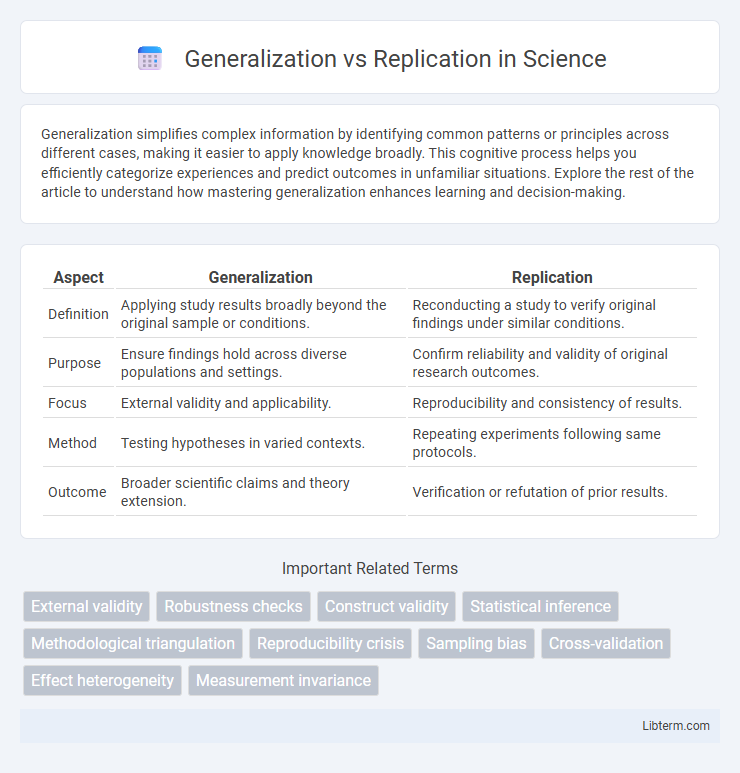Generalization simplifies complex information by identifying common patterns or principles across different cases, making it easier to apply knowledge broadly. This cognitive process helps you efficiently categorize experiences and predict outcomes in unfamiliar situations. Explore the rest of the article to understand how mastering generalization enhances learning and decision-making.
Table of Comparison
| Aspect | Generalization | Replication |
|---|---|---|
| Definition | Applying study results broadly beyond the original sample or conditions. | Reconducting a study to verify original findings under similar conditions. |
| Purpose | Ensure findings hold across diverse populations and settings. | Confirm reliability and validity of original research outcomes. |
| Focus | External validity and applicability. | Reproducibility and consistency of results. |
| Method | Testing hypotheses in varied contexts. | Repeating experiments following same protocols. |
| Outcome | Broader scientific claims and theory extension. | Verification or refutation of prior results. |
Understanding Generalization in Research
Understanding generalization in research involves applying findings from a sample to a broader population, ensuring the results are relevant beyond the initial study context. Generalization depends on representativeness, sample size, and methodological rigor, which enhance the external validity of research outcomes. Researchers prioritize accurate generalization to inform theory development and practical applications across diverse settings.
The Essence of Replication Studies
Replication studies verify the reliability and validity of scientific findings by repeating experiments under similar or varying conditions to confirm consistency. The essence of replication lies in distinguishing true effects from anomalies, enhancing the credibility and robustness of research conclusions. This process strengthens generalization by demonstrating that results are reproducible across different contexts, populations, or settings.
Key Differences: Generalization vs Replication
Generalization involves applying research findings from a specific sample to a broader population, emphasizing external validity and the ability to predict outcomes across different contexts. Replication focuses on repeating a study's methodology and procedures to verify the reliability and accuracy of the original results, highlighting consistency and internal validity. While generalization extends findings to wider settings, replication tests the robustness and reproducibility of those findings within the same or similar conditions.
Importance in Scientific Methodology
Generalization allows scientific findings to extend beyond specific studies, providing broader applicability and enhancing the relevance of results across diverse populations or conditions. Replication verifies the reliability and validity of original research by repeating studies under similar or varied conditions to confirm consistent outcomes. Together, generalization and replication strengthen the scientific methodology by ensuring findings are both robust and widely applicable.
Challenges in Achieving Generalization
Achieving generalization in machine learning models faces challenges such as overfitting to training data, resulting in poor performance on unseen datasets, and the difficulty of capturing diverse real-world variations within limited samples. Models may struggle with distribution shifts when the training data does not adequately represent the variability of deployment environments. Ensuring robust generalization demands comprehensive datasets, regularization techniques, and validation strategies to mitigate bias and enhance adaptability.
Barriers to Successful Replication
Barriers to successful replication include variations in experimental conditions, participant differences, and methodological inconsistencies that hinder generalizing findings across studies. Lack of standardized protocols and incomplete reporting of original methods complicate attempts to reproduce results accurately. Moreover, publication bias favoring positive outcomes discourages transparent disclosure of replication failures, limiting the advancement of robust scientific knowledge.
Practical Examples from Various Fields
Generalization allows machine learning models to apply learned patterns to new, unseen data, enhancing predictive accuracy across diverse datasets such as healthcare diagnostics or financial forecasting. Replication involves conducting studies or experiments multiple times, like in psychology or drug development, to verify results' reliability and eliminate biases. In marketing analytics, generalization helps predict consumer behavior across segments, while replication ensures experimental campaigns reliably yield consistent outcomes before large-scale deployment.
Implications for Research Validity
Generalization assesses whether research findings apply beyond the original study context, enhancing external validity by demonstrating broader relevance across populations and settings. Replication tests the reliability of results through repeated studies, reinforcing internal validity by confirming consistent outcomes under similar conditions. Both generalization and replication are essential for robust research validity, ensuring findings are both accurate and widely applicable.
Strategies to Balance Generalization and Replication
Effective strategies to balance generalization and replication involve selecting diverse and representative sample populations to enhance external validity while maintaining rigorous experimental controls for reproducibility. Employing multi-site studies and varying contextual conditions fosters broader applicability of findings, supporting generalization without compromising replication accuracy. Integrating meta-analytic techniques further synthesizes results across studies, identifying consistent patterns that strengthen both the generalizability and replicability of research outcomes.
Future Directions in Research Practices
Future directions in research practices emphasize integrating generalization and replication to enhance the robustness of scientific findings. Emerging methodologies prioritize large-scale replication studies paired with diverse sample populations to improve external validity and ensure findings extend across contexts. Advances in open science and data sharing platforms facilitate collaborative replication efforts while promoting transparency and cumulative knowledge building.
Generalization Infographic

 libterm.com
libterm.com